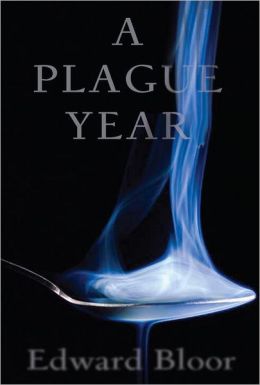A Plague Year, by Edward Bloor
Sep 3
2013

For a book about the devastating effect of methamphetamine on a small Pennsylvania town, Edward Bloor's novel A Plague Year is surprisingly readable. Bloor never shies away from the horror of his subject matter, but his overall message is one of courage—even if it's the kind of courage that only appears after people realize they have nothing left to lose.
A Plague Year ties together Daniel Defoe's 1722 novel A Journal of the Plague Year (a psuedo-eyewitness account of 1665, the year the Great Plague hit London), the the events of 9/11, Don Taylor's play The Roses of Eyam, and George Romero's Night of the Living Dead. Bloor's story opens on September 10th, 2001. When high school freshman Tom Coleman prevents a pair of ski-masked thieves from ripping out the ATM in front of his father's grocery store, he has no idea of the wave of meth-fueled crime that's about to hit the tiny coal-mining town of Blackwater, PA. It starts out small—stolen cleaning supplies and cold medicine—but rapidly escalates into a public health crisis that affects nearly everyone Tom knows.
Bloor uses his motley (and, frankly, rather implausible*) list of literary and film references to compare meth addicts to zombies, and the effects of meth use on the larger community to an outbreak of the plague. His book has some preachy moments, and a couple of too-obvious villains, but these missteps are offset by the low-key charm of his protagonist. Tom makes plenty of mistakes, ranging from falling for the wrong girl to failing to protect the Down's Syndrome kid who works at his father's store, but he begins the story as a child who dreams of running away and ends it as someone who realizes that he has a role to play in fixing his community's problems. The combination of his awkward but endearing coming-of-age and the innate drama of Bloor's subject matter should make A Plague Year incredibly rewarding for young readers looking for good social-issues stories.
*Note: In what I found to be the least-plausible aspect of the story, Tom's Freshman English teacher assigns his class Defoe's novel, which includes sentences like this one:
A Plague Year ties together Daniel Defoe's 1722 novel A Journal of the Plague Year (a psuedo-eyewitness account of 1665, the year the Great Plague hit London), the the events of 9/11, Don Taylor's play The Roses of Eyam, and George Romero's Night of the Living Dead. Bloor's story opens on September 10th, 2001. When high school freshman Tom Coleman prevents a pair of ski-masked thieves from ripping out the ATM in front of his father's grocery store, he has no idea of the wave of meth-fueled crime that's about to hit the tiny coal-mining town of Blackwater, PA. It starts out small—stolen cleaning supplies and cold medicine—but rapidly escalates into a public health crisis that affects nearly everyone Tom knows.
Bloor uses his motley (and, frankly, rather implausible*) list of literary and film references to compare meth addicts to zombies, and the effects of meth use on the larger community to an outbreak of the plague. His book has some preachy moments, and a couple of too-obvious villains, but these missteps are offset by the low-key charm of his protagonist. Tom makes plenty of mistakes, ranging from falling for the wrong girl to failing to protect the Down's Syndrome kid who works at his father's store, but he begins the story as a child who dreams of running away and ends it as someone who realizes that he has a role to play in fixing his community's problems. The combination of his awkward but endearing coming-of-age and the innate drama of Bloor's subject matter should make A Plague Year incredibly rewarding for young readers looking for good social-issues stories.
*Note: In what I found to be the least-plausible aspect of the story, Tom's Freshman English teacher assigns his class Defoe's novel, which includes sentences like this one:
"My brother, though a very religious man himself, laughed at all I had suggested about its being an intimation from Heaven, and told me several stories of such foolhardy people, as he called them, as I was; that I ought indeed to submit to it as a work of Heaven if I had been any way disabled by distempers or diseases, and that then not being able to go, I ought to acquiesce in the direction of Him, who, having been my Maker, had an undisputed right of sovereignty in disposing of me, and that then there had been no difficulty to determine which was the call of His providence and which was not; but that I should take it as an intimation from Heaven that I should not go out of town, only because I could not hire a horse to go, or my fellow was run away that was to attend me, was ridiculous, since at the time I had my health and limbs, and other servants, and might with ease travel a day or two on foot, and having a good certificate of being in perfect health, might either hire a horse or take post on the road, as I thought fit."That's a single sentence, mind you. No high school English teacher would do that to their students. There's a reason they all assign To Kill a Mockingbird: the reading itself is dead easy, and the symbolism is written a mile-high.
Posted by: Julianka
No new comments are allowed on this post.
Comments
No comments yet. Be the first!